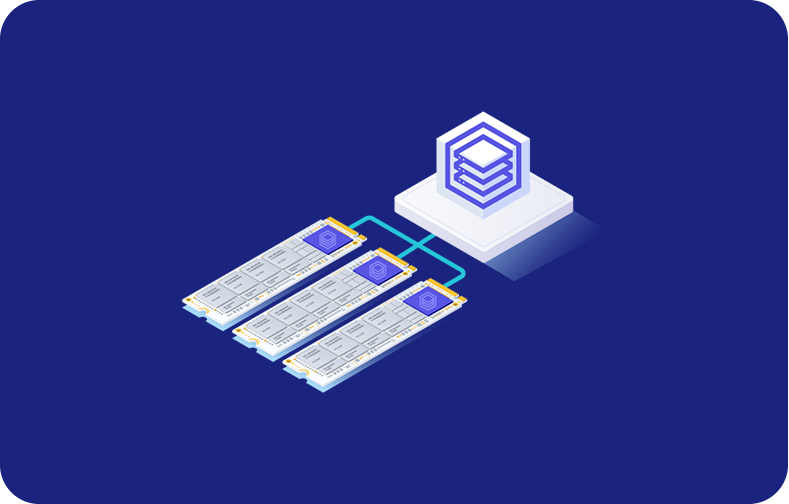Security Cloud Data With VPS

In modern digital operations, safeguarding cloud data is paramount, urging businesses and tech enthusiasts to explore reliable solutions. Amid this quest, Virtual Private Servers (VPS) have surfaced as a pivotal ally in data security, presenting a blend of flexibility, control, and dedicated resources. Illuminating the critical role that VPS technology plays in fortifying digital assets against the ever-evolving spectrum of cyber threats enriches our understanding of its importance.
At the heart of the discussion is the nuanced understanding that securing cloud data transcends mere preference—an imperative strategy in today's interconnected world. With its inherent capabilities for customization and scalability, VPS security hosting offers a bespoke security posture that is increasingly recognized for its efficiency and reliability.
-
- What Exactly Is VPS?
- What is VPS Security?
- Is It Possible To Hack A VPS?
- VPS as a Cloud Data Security Layer
-
14 Best Practices of Security Cloud Data With VPS
- 1. Keep An Eye On Your Server Logs
- 2. Use SFTR Rather Than FTP
- 3. Inadequate Oversight
- 4. Examine The Rights of Users
- 5. Disable Root Logins
- 6. Access Controls and Strong Authentication
- 7. No Function-Level Control
- 8. Turn Off IPv6
- 9. Remove Unnecessary Modules and Packages
- 10. Data Encryption
- 11. Frequent Updates and Effective Patch Management
- 12. Firewall Configuration and Network Security
- 13. Intrusion Detection Systems
- 14. Planning For Backup and Disaster Recovery
- Why Choose VPSServer for Optimal Security Cloud Data with VPS
While exploring the offerings in the VPS domain, one encounters VPSServer.com, a provider that epitomizes the convergence of performance, security, and adaptability. Their approach to cloud VPS hosting—characterized by cutting-edge technology and a staunch commitment to security—provides a glimpse into the future of secure digital infrastructures.
However, the essence of VPS security in enhancing cloud data security extends beyond individual service providers. It encapsulates a broader narrative on the strategic advantage of leveraging dedicated resources and advanced security measures to protect sensitive data. With the ability to tailor security protocols to specific organizational needs, VPS hosting stands out as a versatile and robust solution, shedding light on the multifaceted benefits of VPS in securing cloud data and setting the stage for how businesses can navigate the digital landscape securely and efficiently.
What Exactly Is VPS?

In the realm of web hosting, Virtual Private Server (VPS) hosting emerges as a transformative solution, leveraging virtualization technology to earmark dedicated resources for each user on a server populated by numerous accounts. This innovative approach transcends the limitations of shared hosting, where a dedicated server space still needs to be discovered.
Yet, it remains markedly more accessible and budget-friendly than the exclusive rental of an entire server. This unique positioning of VPS hosting renders it an exemplary choice for web admins whose sites attract a moderate volume of traffic, surpassing the capabilities of shared hosting without necessitating the comprehensive resources of a standalone server.
Distinguished by its remarkable equilibrium between affordability, efficacy, and security, VPS hosting introduces a secluded computing environment for each user. Users gain access to their virtual machine within this virtualized space, complete with a personal operating system. This autonomy elevates security and performance by isolating each user from their server mates and affords users the superuser privileges needed to tailor their software landscape on the operating systems.

Such unparalleled control proves indispensable for the meticulous management of cloud data security. Through VPS hosting, entities ranging from burgeoning startups to seasoned developers can fortify their cloud-stored data while reaping the benefits of cloud computing's adaptability and meticulous control akin to dedicated resources.
Furthermore, the role of VPS hosting in buttressing initiatives for secure cloud data continues to gain recognition. The intrinsic isolation characteristic of a VPS environment acts as a bulwark against data breaches and unauthorized access, starkly contrasting the vulnerabilities of shared hosting setups. VPS security hosting presents an attractive proposition for those vested in protecting their digital assets while desiring to capitalize on the scalability and operational efficiency of cloud technologies.
From safeguarding sensitive client information and facilitating robust e-commerce platforms to hosting dynamic applications, VPS hosting assures a fortified, scalable, and economically viable hosting milieu. The amalgamation of exclusive resources, enhanced security protocols, and flexible resource allocation underscores VPS hosting as a premier choice for those aspiring to elevate their cloud data security and operational performance.
What is VPS Security?

In the dynamic expanse of digital innovation and the cloud's boundless skies, safeguarding the sanctums of cloud data unfurls as a critical quest for corporate entities and solitary navigators. Amidst this digital tapestry, the Virtual Private Server (VPS) ascends as a bastion of security, a guardian that elevates the fortifications of cloud-based realms against the spectral threats of the cyber netherworld.
The essence of choose-managed VPS security, a vital strand woven into the vast fabric of cybersecurity, is its vigilant stand against the dark arts of SQL injections, digital mischief, and the covert whispers of sniffing assaults. Through the sanctity of a VPS server, digital denizens are bestowed with sanctuaries of isolation for their digital creations, a bulwark against the malignant spread of contamination that lurks in the shadows of communal hosting domains.
This sanctuary not only shields the sanctity of cloud data but also stands as a beacon of security amidst the swirling maelstrom of cyber threats. Venturing deeper into the sanctum of VPS security reveals not merely a bastion of isolation but a fortress replete with an arsenal of defensive measures. This arsenal is forged from the ceaseless vigilance of updates and patches, the unyielding barriers of access control, and the impenetrable veils of firewall and encryption magics.

Together, these practices conjure a shield of unparalleled strength, guarding the heart of virtual servers from the specters of unauthorized incursions and the shadows of data breaches, ensuring that within the cloud's vast dominion, the light of security endures against the encroaching darkness.
Furthermore, the hosting provider's role becomes crucial, as their support, built-in security features, and offered services determine the baseline security level of the VPS. Providers like VPSserver.com, as explored through their website and others, offer insights into advanced security measures such as DDoS protection, intrusion detection systems, and secure data backup solutions.
These features ensure that sensitive cloud data is protected from external threats and preserved against data loss, making VPS an indispensable tool in the quest for comprehensive cloud data security.
Is It Possible To Hack A VPS?

Within the dynamic tapestry of digital innovation, as the guardianship of cloud data ascends to unparalleled prominence, the enigma of VPS (Virtual Private Server) susceptibility casts a towering shadow. This odyssey towards securing cloud data with VPS transcends mere data protection; it's about erecting an impregnable citadel in a domain perpetually besieged by cyber entities that evolve and increase relentlessly.
The possibility of hacking a VPS is a concern that merits a deep dive into the intricacies of virtual server security, revealing the layers of defense that stand between data sanctity and digital marauders. VPS, by design, offers a more secluded environment compared to shared hosting, which inherently boosts its security posture.
This sanctum of isolation plays a pivotal role in diminishing the peril of cross-contamination—a notorious vulnerability in communal digital resources. Yet, akin to any citadel of old, the integrity of its bulwarks is intrinsically tied to the alertness and dedication of those who stand watch. A Virtual Private Server, though nestled within layers of digital defenses, remains vulnerable to the cunning of cyber invaders if its ramparts are left unattended.

The chinks in its armor, through which evil forces may seek entry, span the gamut from unpatched software fissures and frail passcodes to defenses weakened by insufficiently robust firewall provisions. To counteract these vulnerabilities, adopting a multi-layered security strategy is non-negotiable. Regular updates and meticulous patch management form the first line of defense, ensuring that the software running on the VPS lacks of exploitable loopholes.
Furthermore, implementing robust access controls and authentication mechanisms fortifies the gates against unauthorized entry. At the same time, advanced encryption protocols encrypt the data, turning it into an indecipherable code for anyone who might intercept it. Moreover, deploying a comprehensive firewall and actively monitoring network traffic for anomalies can shield the VPS from a myriad of attack vectors, from SQL injection to DDoS assaults.
While the possibility of hacking a VPS exists, the extent to which a VPS is vulnerable largely hinges on the security measures in place. The journey to security cloud data with VPS is continuous, demanding constant vigilance, regular maintenance, and a proactive stance on security. This illustrates the adage that the might of a stronghold lies not merely in the towering height of its barriers but in the unwavering dedication of those who guard it. Grasping the possible dangers and adopting a comprehensive security strategy ensures the integrity of cloud data on a VPS, rendering it a powerful adversary against digital dangers.
VPS as a Cloud Data Security Layer

In the realm of digital fortification, the role of Virtual Private Servers (VPS) transcends the traditional security paradigms, positioning itself as an indispensable sentinel in the safeguarding of cloud data. Far from being a mere repository, the VPS emerges as a dynamic, fortified ecosystem, infused with a blend of cutting-edge security protocols.
This integrated matrix of encryption techniques, firewall defenses, and vigilant intrusion detection systems weaves an impenetrable fabric around data, ensuring its sanctity in flux or at rest. The deployment of formidable cryptographic algorithms, including SSL/TLS and AES, elevates the sanctity of data, imbuing it with unparalleled confidentiality and integrity.
This narrative further unfolds to underscore the imperative of embracing best practices in the stewardship of VPS, a mantra for achieving zenith levels of security. Central to this approach is the diligent execution of software updates and the management of patches, serving as a critical defense mechanism against the lurking dangers posed by system vulnerabilities. Moreover, the deployment of rigorous authentication techniques, such as multi-factor authentication (MFA) and biometric verification, effectively blocks attempts at unauthorized entry.

This discussion highlights the careful control of firewalls and the implementation of Intrusion Detection and Prevention Systems (IDS/IPS), indicating a move towards active monitoring and immediate threat disruption. The importance of conducting regular backups and developing a disaster recovery strategy is highlighted, not merely as a cautious step but as a fundamental component of ensuring data's endurance and recovery capabilities.
In summation, the integration of VPS into the cloud data security architecture is portrayed as a masterstroke, arming businesses with a comprehensive shield against the multifaceted cyber threats that pervade the digital ether. This multifaceted strategy, marrying regular technological updates with stringent access controls and proactive oversight, significantly amplifies the security posture of cloud-based assets.
In the ever-evolving tableau of cyber threats, the VPS stands as a beacon of security, resilience, and exclusivity in data access, reinforcing the imperative for organizations to refine their security frameworks in perpetual alignment with best practices. This narrative not only delineates the significance of VPS in the contemporary security landscape but also champions the ethos of continuous improvement and vigilance in the quest to safeguard the digital commons.
14 Best Practices of Security Cloud Data With VPS

Virtual Private Servers (VPS) have emerged as a critical fortress in safeguarding cloud data in the evolving digital security landscape. By offering an isolated environment, this technology significantly reduces risks associated with shared hosting, such as cross-contamination and cyber threats.
The implementation of VPS enhances cloud data security through practices like data encryption, rigorous access controls, and advanced firewall and intrusion detection systems. Regular updates and patches, alongside solid authentication methods, fortify these virtual servers against unauthorized access and data breaches.
As we explore the 14 best practices for securing cloud data with VPS, it's essential to understand these strategies not just as recommendations but as integral components of a robust cybersecurity framework, crucial for protecting sensitive information in our increasingly digital world.
1. Keep An Eye On Your Server Logs

Monitoring server logs provides invaluable insights into VPS operations and potential security threats, like a shop owner identifying a repeat shoplifter through observed behaviors. Regular analysis of these logs, particularly in critical directories such as /var/log, is crucial for detecting early signs of unauthorized access attempts and unusual activity patterns.
This process enables administrators to proactively identify and address vulnerabilities by examining server load, resource usage, and system events, thereby enhancing the server's security and operational integrity. Consistently reviewing logs for early detection plays a pivotal role in preventing hacking attempts from escalating into severe crises.
This proactive approach, by drawing parallels to recognizing suspicious behavior in physical security, significantly reduces the risk of cyber attacks and can be the key factor in averting catastrophic breaches.
2. Use SFTR Rather Than FTP

FTP once reigned as the go-to method for file transfers, but its absence of encryption left transferred data vulnerable to interception. In response, Secure File Transfer Protocol (SFTP) was developed, mirroring FTP's functionality while incorporating crucial data encryption. Adopting SFTP has become the gold standard for protecting data on Virtual Private Servers (VPS).
Imagine transmitting sensitive customer details or confidential business information. Utilizing SFTP equates to dispatching a sealed, safeguarded parcel, whereas relying on FTP is akin to sending a postcard — accessible for anyone to view upon interception.
3. Inadequate Oversight

Lack of diligent monitoring in server management can lead to unrecognized security threats, such as mistaking a DDoS attack for increased legitimate traffic. To counteract potential risks, a robust monitoring strategy is essential. This strategy should employ advanced tools to continuously observe traffic patterns, server performance, and access anomalies, establishing a norm for regular operations to quickly detect deviations.
Incorporating automated threat detection systems that use machine learning can help distinguish between normal and malicious activities efficiently. These systems evolve to become more adept at identifying threats enhancing server security proactively.
Ensuring rapid response to suspicious activities through a well-defined incident response plan, alongside regular security protocol reviews, is crucial for maintaining server and data integrity. Ultimately, shifting from minimal oversight to proactive anomaly monitoring creates a secure and reliable server environment, safeguarding against the dynamic nature of cyber threats and ensuring continuous operational trust.
4. Examine The Rights of Users

Ensuring server security on your VPS hosting requires a diligent review and management of user access rights, particularly on controlling root user privileges to protect against unnecessary exposure of sensitive data and resources.
It's critical to ensure that only approved personnel have access to the server, as security threats can arise not only from external sources but also from within. By setting precise user access limits and leveraging Linux's privilege management features, you can assign specific permissions to mitigate these risks.
Regular audits and updates of user permissions are essential in maintaining vigilance over internal threats, just as important as guarding against external ones. This proactive approach to managing user rights helps prevent potentially catastrophic security breaches, safeguarding your server by maintaining a secure and controlled access environment.
5. Disable Root Logins

Securing a Linux VPS demands careful root access management due to the unrestricted server control root logins provide. Logging in as "root" poses significant risks, as it allows for any changes to be made, making the root account a prime target for cybercriminals. Administrators are advised to use a standard user account for daily tasks, elevating to root access only when necessary.
This approach, coupled with limiting direct root logins—a lesson underscored by Dropbox's data breach due to compromised employee credentials—minimizes the risk of attacks. Employing non-root users for regular admin activities and reserving root privileges for specific needs reduces the attack surface.
Further enhancing protection, disabling direct root logins requires authentication via a non-root account before privilege escalation. Establishing a secondary account for root-level tasks as needed ensures safety and flexibility, safeguarding against brute-force attacks while adhering to stringent security measures.
6. Access Controls and Strong Authentication

Ensuring the security and protection of VPS resources demands the adoption of robust authentication strategies. Sole dependence on passwords for authentication leaves systems vulnerable to hazards such as credential stuffing and brute-force incursions.
The introduction of sophisticated authentication techniques, including multi-factor authentication (MFA) and biometric verification, fortifies security by requiring users to provide several verification tokens.
Such strategies markedly obstruct unauthorized entries, even in instances where cyber intruders succeed in obtaining a password. Enhanced authentication methods offer protection from phishing attacks and password leaks, reducing the likelihood of unauthorized entry.
7. No Function-Level Control
Lacking function-level control in a VPS severely undermines security by enabling unrestricted user actions, making the system vulnerable to unauthorized access and attacks. Such a deficiency violates the principle of least privilege, increasing the risk from insider and external threats. Implementing function-level control restricts users to their authorized functions, greatly mitigating exploitation risks.
By adopting role-based access controls (RBAC), the system aligns user activities with their roles, enhancing security, compliance, and server protection through precise activity monitoring. Function-level control refines user permissions to specific activities, preventing unauthorized actions like unintended or malicious traffic changes.
For example, it ensures a finance department employee can only access payroll information relevant to their role, closing gaps for errors or misuse. This focused approach is crucial for a secure, compliant VPS environment, safeguarding sensitive functions and data effectively.
8. Turn Off IPv6

Disabling IPv6 on your VPS, the latest version of the Internet Protocol, can significantly enhance security by reducing vulnerabilities and the risk of cyber threats associated with unused or improperly secured IPv6 protocols.
Cybercriminals often exploit IPv6 to distribute harmful traffic, making its deactivation a strategic move to diminish the attack surface and protect cloud data on VPS servers. However, it's essential to manage this process with caution to prevent introducing unintended vulnerabilities, especially since some software may rely on IPv6 functionality.
Proper configuration and implementation of security measures are vital when turning off IPv6 to ensure robust server protection without compromising the system's integrity or functionality. This balanced approach ensures that you reduce exposure to cyber threats while maintaining a secure and reliable server environment.
9. Remove Unnecessary Modules and Packages
A complex cyber assault took advantage of a vulnerability within the Apache Struts web framework, leading to the compromise of confidential data for 143 million individuals during the notorious Equifax data breach. Multiple enterprises might have avoided this catastrophe.
Each preloaded software package or module may bring potential security gaps, and not all are essential for your activities. Eliminating unnecessary or outdated packages minimizes the potential avenues for breach.
10. Data Encryption

A Virtual Private Server (VPS) provides an essential security barrier through data encryption to protect confidential information. Encryption technologies such as SSL/TLS for transmitting data and AES for stored data ensure that all information processed or kept on the VPS remains secure, making it unreadable without the correct decryption keys.
This layer of security maintains the protection of data against breaches, interception, or unsanctioned access, even in the event of a VPS compromise. By adopting robust encryption methods, a VPS ensures the privacy and integrity of data, significantly boosting security measures for applications and services hosted in the cloud.
11. Frequent Updates and Effective Patch Management

Maintaining the most recent security updates on a VPS is crucial for protection against possible security risks. Through the installation of these patches, the system mitigates identified weaknesses, which results in enhanced performance and increased reliability of the system.
The critical role of regular updates and patch management is to rectify software weaknesses that hackers frequently target to infiltrate systems and pilfer confidential data.
Companies can significantly reduce vulnerabilities by consistently implementing updates and patches, greatly diminishing the risk of unauthorized access to their systems.
A methodical strategy for managing updates and patches guarantees that the system operates with the latest software iterations, frequently introducing new features, improved performance, and crucial security enhancements to address the continuous advancement of cyber threats.
12. Firewall Configuration and Network Security

Firewalls are essential for safeguarding your VPS, as they help limit incoming and outgoing traffic. Configuring firewall rules on a Leaseweb VPS enables you to limit access to specific ports, services, and IP addresses.
By reducing the number of accessible ports to just the ones needed for your VPS, you can lower its susceptibility to threats. Closing off ports that are not in use lowers the chance of unauthorized entry.
Enhance the protection of your Virtual Private Server by implementing advanced firewall filtering techniques. These protocols scan and intercept potentially harmful data packets, protecting your network against cyber attacks.
13. Intrusion Detection Systems
This system continually monitoring data flow from the network and detecting indications of possible security breaches. It maintains awareness of any indications of malicious activity, like attempts to exploit vulnerabilities or acts that could damage the network's integrity.
In contrast, intrusion prevention comprises reacting to recognized threats by blocking data packets or terminating connections.
These protective measures are executed through intrusion detection systems (IDS) and intrusion prevention systems (IPS), which are integrated within next-generation firewalls (NGFW) as elements of holistic network security strategies designed to thwart and avert potential cyber-attacks.
14. Planning For Backup and Disaster Recovery
It is the final security cloud data using VPS best practices. Disaster recovery and backup procedures include creating or updating additional copies of files regularly, storing these copies in multiple locations, and using these backups to continue or restart business operations in the event of data loss due to fire, data corruption, a computer virus, or a natural disaster.
Backup and disaster recovery are separate procedures that might be mistaken with one another or the entire method. Backing up involves creating duplicate files.
Following an outage, disaster restoration refers to the approach and procedures to quickly restore access to information, apps, and IT resources.

Why Choose VPSServer for Optimal Security Cloud Data with VPS
Choosing VPSServer.com for cloud data security with VPS offers optimal protection in today's era of prevalent data breaches and cyber threats. VPSServer.com distinguishes itself in the cloud VPS hosting market with its high-performance, scalable, and secure solutions suitable for businesses of all sizes.
VPSServer.com's deployment of cutting-edge technologies, including SSD NVMe Storage, DDoS protection, consistent security patches, and sophisticated firewall settings, guarantees the safeguarding of digital assets from new threats.
This steadfast dedication to safeguarding digital realms, amplified through the allocation of exclusive resources, the liberty to tailor configurations, and the capacity for growth, empowers organizations with the versatility and governance needed to refine security frameworks according to their distinct demands.
Moreover, the extensive constellation of data centers spanning the planet not only elevates operational efficiency but also guarantees compliance with international data sovereignty mandates and strengthens contingency strategies for data recovery.
The focus of VPSServer.com on security, alongside its performance and scalability, positions it as a key player for cloud data protection, highlighting the indispensable role of VPS in contemporary digital strategies.
Frequently Asked Questions
What Defines a Virtual Private Server (VPS) and Its Role in Cloud Data Security?
A Virtual Private Server represents a hosting paradigm powered by virtualization technology, assigning dedicated resources within a server shared by several users. This model harmonizes cost-effectiveness with performance and heightened security, offering users a segregated operational space.
Such isolation substantially mitigates risks like data breaches and unsanctioned access, showcasing a stark security advancement over traditional shared hosting setups.
Delineating VPS Security Versus Conventional Web Hosting Safeguards?
In contrast to the conventional shared web hosting framework, VPS security introduces a segregated, controllable environment. This autonomy allows users to implement and customize their security architecture, encompassing firewalls, encryption, and stringent access protocols.
These tailored measures are pivotal in fortifying against digital threats and upholding data integrity, underlining the superior protective capabilities inherent in VPS hosting.
Assessing the Vulnerability of VPS to Cyber Attacks and Proactive Defense Strategies?
Despite the intrinsic security benefits of a VPS's isolated environment, vulnerabilities to cyber incursions remain without rigorous safeguards.
To fortify a VPS, a multifaceted approach is essential:
Persistently updating and managing patches
Enforcing robust authentication and access controls
Deactivating extra services
Integrating encryption alongside firewall defenses
These strategies fortify the VPS against unauthorized breaches and cyber threats, ensuring a robust defense mechanism.
What are some best practices for securing cloud data with VPS?
Best practices include monitoring server logs, using SFTP instead of FTP for file transfers, managing user permissions carefully, turning off root logins, implementing strong access controls and authentication, removing unnecessary modules and packages, encrypting data, and regularly updating software and applying patches.
How does disabling root logins enhance VPS security?
Turning off root login access restricts immediate entry to the server's most elevated privilege levels. It's recommended for users to utilize regular user accounts for their everyday tasks, resorting to elevated privilege levels solely as required. This approach significantly reduces the likelihood of unwarranted access and minimizes the vulnerability to security infringements.
How does encryption enhance the safety of data stored on a Virtual Private Server?
Encryption is critical in safeguarding data within a VPS, as it transforms information into a format indecipherable to those without authorization. Adopting encryption protocols like SSL/TLS for data being transferred and AES for stored data ensures the privacy and accuracy of sensitive data, shielding it from unauthorized breaches and exploitation.
Why is monitoring server logs necessary for VPS security?
Keeping a vigilant eye on server logs is pivotal in spotting preliminary indicators of illicit access attempts and abnormal behavior, empowering administrators to fortify security loopholes preemptively. This strategy is indispensable for unearthing potential security hazards and safeguarding the server's protective measures and seamless functioning.
Why choose VPSServer.com for cloud data security with VPS?
VPSServer.com delivers superior VPS hosting services that are both fast and flexible, harnessing advanced technologies such as SSD NVMe Storage, DDoS safeguards, and intricate firewall setups. With a keen emphasis on ensuring security, enhancing performance, and providing scalability, they stand out as a prime selection for organizations aiming to safeguard their digital resources and adhere to data sovereignty standards.











